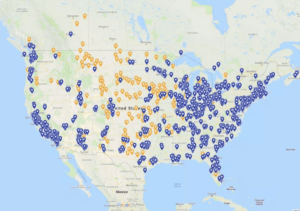A few years ago, I was listening to the Range podcast made by two of my friends—Julia Ritchey and Amy Westervelt. It’s a great show about life in the West, and this particular episode was about the controversies surrounding coyote hunting, but about halfway through the podcast, I noticed that people were pronouncing “coyote” two different ways: the three syllable “coyote” and the two-syllable “coyote.” Here are two clips:
Julia Ritchie (podcast host): After their first petition to get a coyote hunting ban failed, they tried again in November of last year, and about 40 people spoke. I tallied it up. (3:51-3:57)
Fred Knowlton (a retired professor who studied coyotes for 40 years): Personally, I don’t believe any of the coyote hunting expeditions by the general public are effective in reducing coyote numbers. (6:42-6:52)
I did some research and didn’t find anything definitive, and then I put the question out to the Grammar Girl Facebook page, and got more than 1,800 responses, which is why it’s nearly three years later that I’ve gone through all the comments, made a map, and am now telling you about it. Wow. Thanks for all that! I didn’t word the question in a way that makes this a scientific study, but 1,800 responses certainly rivals things I’ve seen published in journals.

Since then I’ve also done more research, so here’s what I found.
Table of Contents
Many Ways to Pronounce ‘Coyote’
There are actually more than two different ways to pronounce it. You have “kai-oat-ee” and “kai-oat,” which you heard in the clips, but then some people pronounce it with a little bit of a different ending—“kai-oat-eh”—and people honoring the Spanish origin or who live near the Mexican border in the United States might pronounce it the Spanish way: “coy-yoh-tay.” And the Cambridge Dictionary says the British pronunciation is “coy-oh-tee.” So we can safely say there are at least five—five—different pronunciations that people are regularly using to describe this animal, and I bet there are some I haven’t even found. And that’s just in current times.
A publication from the late 1800sopens TEXT file by the American Dialect Society notes that at that time the word was often mispronounced as “cayote.” Although I’m guessing at the pronunciation. The “cay” part at the beginning is clear, but your guess is as good as mine as to how they meant people pronounced the last part. It could be “cay-oat.” It’s just spelled C-A-Y-O-T-E.
Most of what I’ll talk about next is just about the first two pronunciations because that’s what I asked people about, and I made a map of the responses. What will jump out at you first is that the “kai-oat” pronunciation is much more prominent in the middle of the United States than anywhere else—it spans a somewhat expanded Great Plains region.
All along the coasts and in the South and through the whole Minnesota-Wisconsin-Ohio region, people primarily seem to say “kai-oat-ee,” but in Montana, Wyoming, the Dakotas, Kansas, Nebraska, and Iowa, “kai-oat” seems dominant. Colorado, Texas, Oklahoma, and Arkansas seem like a mixed bag.
People from the University of South Dakota told me their mascot is the “kai-oat,” but that his name is Charlie, and sometimes they also call him Charlie “Kai-oat-ee.”
But when I started reading the comments themselves, two patterns emerged beyond big-picture geography.
Coyote: The Urban-Rural Divide
First, there seemed to be a clear rural-urban divide. People in cities are more likely to say “kai-oat-ee” and people who live in rural areas are more likely to say “kai-oat.” There were quite a few comments from people who said something like this:
I am from Los Angeles, and we say “kai-oat-ee,” but we would say “kai-oat” when we’re trying to sound like cowboys.
The Wile E. Coyote Influence
Second, there seems to be an age-related divide, with older people saying “kai-oat” and younger people saying “kai-oat-ee,” which, of course, leads us to Wile E. Coyote, the Loony Toons character who’s always getting an anvil dropped on his head by the Road Runner. That cartoon first appeared in 1949.
Many people speculate that younger, urban people say “kai-oat-ee” because the only experience they’ve had with coyotes is from the cartoons, and that may play a role, but I believe the three-syllable version is actually the older version since the word comes to English from the Mexican Spanish word “coy-yoh-tay,” which ultimately goes back to the Nahuatl word “coyotl.” (“koy-OH-tehl”)
I found one radio interview that said “kai-oat” was the original pronunciation in English, but it didn’t provide references, and I’m not convinced. The earliest citations in the Oxford English Dictionary seem to be a mix of the two-syllable and three-syllable version. It’s a mess. The first eight citations spell it seven different ways.
Noah Webster’s original dictionary, published in 1828, doesn’t appear to include the word. The Imperial Dictionary by John Ogilvie published in 1885 (an extension of Webster’s original dictionary), shows two pronunciations with the “kai-oat” pronunciation first, but Webster’s 1913 Unabridged Dictionaryopens TEXT file flips that around and shows the three-syllable pronunciation first, likely pronounced “coy-oh-te,” and then also appears to include an alternative two-syllable pronunciation. It seems that at least in the United States, people have pronounced it both ways for a long time.
For what it’s worth, the “kai-oat” pronunciation seems to be mostly limited to the United States and Canada. Nobody outside those two countries reported saying “kai-oat,” and the Oxford English Dictionary doesn’t include a two-syllable pronunciation. (But the Collins Dictionary does. Argg.)
‘Coyote’: Singular and Plural
And then there were a few comments that don’t fit any of the patterns, but seemed interesting enough to pass along. Two people, for example, said that they use “kai-oat-ee” as the singular, but “kai-oats” as the plural. And another person reported doing the exact opposite. I’m not sure what to make of that except that people are adapting the pronunciations to have different meanings.
‘Coyote’: Smugglers
Along the same lines, at least one person from southern California said he uses “kai-oat” for the animal and “kai-oat-ee” for a person who smuggles immigrants across the border.
‘Coyote’: A Mix of Pronunciations
Finally, there were multiple people who realized they say it both ways, and said they always feel like they aren’t even sure how it should be pronounced, and after going through all the comments and possibilities, I can say that I’m not surprised people are confused!
Quite a few people seem to use two different pronunciations depending on the context, whether they are talking about one or more animals, or even just randomly. Merriam-Webster calls the “kai-oat” pronunciation “chiefly Western,” but that’s not exactly what I found. Among my responses, almost nobody in California or Arizona reported saying “kai-oat,” for example. It could just be that the people in those states who say “kai-oat” aren’t active on my Facebook page, but that seems unlikely.
How to Pronounce ‘Coyote’
So after all this research, what do I think you should do?
If you’re in the U.S., both the two syllable and three syllable versions are fine. Use whatever you prefer or what’s dominant in your region.
But if you’re outside the U.S., it’s probably better to stick with a three-syllable version like “coy-oh-tee” or “kai-oat-ee.” But my research outside the U.S. isn’t as extensive, so if it’s important, you might want to look into it more.
Mignon Fogarty is Grammar Girl and the founder of Quick and Dirty Tips. Check out her New York Times best-seller, “ opens in a new windowGrammar Girl’s Quick and Dirty Tips for Better Writing.”







































![Air gun 101: The differences between .177 & .22 – Which jobs they do best ? [Infographic]](https://airgunmaniac.com/wp-content/uploads/2024/11/1773-150x150.jpeg)



